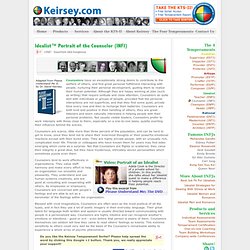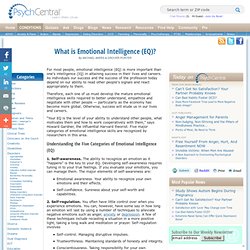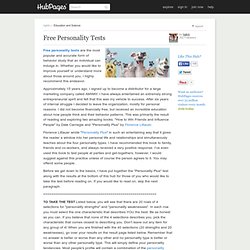

Portrait of the Idealist® Counselor (INFJ) Counselors have an exceptionally strong desire to contribute to the welfare of others, and find great personal fulfillment interacting with people, nurturing their personal development, guiding them to realize their human potential.

Although they are happy working at jobs (such as writing) that require solitude and close attention, Counselors do quite well with individuals or groups of people, provided that the personal interactions are not superficial, and that they find some quiet, private time every now and then to recharge their batteries. Counselors are both kind and positive in their handling of others; they are great listeners and seem naturally interested in helping people with their personal problems. Not usually visible leaders, Counselors prefer to work intensely with those close to them, especially on a one-to-one basis, quietly exerting their influence behind the scenes. Counselors tend to work effectively in organizations. Portrait of the Idealist® Healer (INFP) Healers present a calm and serene face to the world, and can seem shy, even distant around others.

But inside they're anything but serene, having a capacity for personal caring rarely found in the other types. Healers care deeply about the inner life of a few special persons, or about a favorite cause in the world at large. And their great passion is to heal the conflicts that trouble individuals, or that divide groups, and thus to bring wholeness, or health, to themselves, their loved ones, and their community. Healers have a profound sense of idealism that comes from a strong personal sense of right and wrong. They conceive of the world as an ethical, honorable place, full of wondrous possibilities and potential goods. Also, Healers might well feel a sense of separation because of their often misunderstood childhood. At work, Healers are adaptable, welcome new ideas and new information, are patient with complicated situations, but impatient with routine details.
The Sixteen Personality Types - High-Level. ISTJ - The Duty Fulfiller Serious and quiet, interested in security and peaceful living.

Extremely thorough, responsible, and dependable. Well-developed powers of concentration. Usually interested in supporting and promoting traditions and establishments. Well-organized and hard working, they work steadily towards identified goals. Click here for a detailed description of ISTJ. ISTP - The Mechanic Quiet and reserved, interested in how and why things work. Click here for a detailed description of ISTP. What is Emotional Intelligence (EQ)? For most people, emotional intelligence (EQ) is more important than one’s intelligence (IQ) in attaining success in their lives and careers.

As individuals our success and the success of the profession today depend on our ability to read other people’s signals and react appropriately to them. Therefore, each one of us must develop the mature emotional intelligence skills required to better understand, empathize and negotiate with other people — particularly as the economy has become more global. Otherwise, success will elude us in our lives and careers. “Your EQ is the level of your ability to understand other people, what motivates them and how to work cooperatively with them,” says Howard Gardner, the influential Harvard theorist.
Five major categories of emotional intelligence skills are recognized by researchers in this area. Understanding the Five Categories of Emotional Intelligence (EQ) Birthday Calculator. The 5 Love Languages® Free Personality Tests. Hopefully you have now completed the selection of 1 item from each of the 20 rows for "Strengths" and "Weaknesses" on the test.

Here is how you grade yourself. Count the check marks for each of the 4 columns for both tests. Next, total them. You should have 4 numerical results, one for each column. The grand total should be 40 check marks, 20 for each of the 2 tests above. Column 1 represents the Sanguine personality Column 2 represents the Choleric personality Column 3 represents the Melancholy personality Column 4 represents the Phlegmatic personality For example: you might have the following results: Column 1 - 18 Column 2 - 12 Column 3 - 6 Column 4 - 4 This means that your tendencies lean towards a Sanguine, Choleric personality.
REMEMBER - There is Not a Failing or Passing Grade. Here, are some more characteristics of the 4 types. The Extrovert The Talker The Optimist Makes home fun Is liked by children's friends Turns disaster into humor Is the circus master.